Emotions ran high on November 9, 2023 at the third Appeal of Documentary Films event at Hisao & Hiroko Taki Plaza (Taki Plaza) with screenings of the documentary To live: People who fought a lawsuit over tsunami deaths. The film portrays the 10-year struggle of the families of school children in Ishinomaki, Miyagi Prefecture who passed away in the tsunami that followed the 2011 Great East Japan Earthquake* and the legal action they took against authorities to find out why their loved ones died. Screenings were held at the central staircase area and the event space within the student exchange hub on Ookayama Campus.
- *
Okawa Elementary school lost 70 percent of its student population — 74 children, four of whom are still missing — and 10 teaching and staff members in the 2011 tsunami.
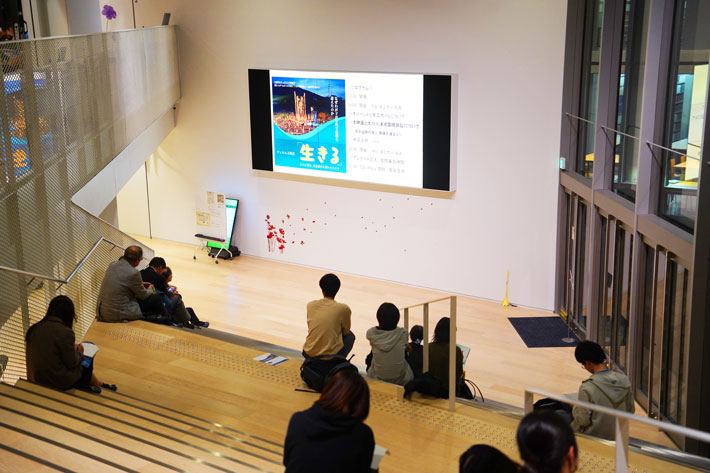
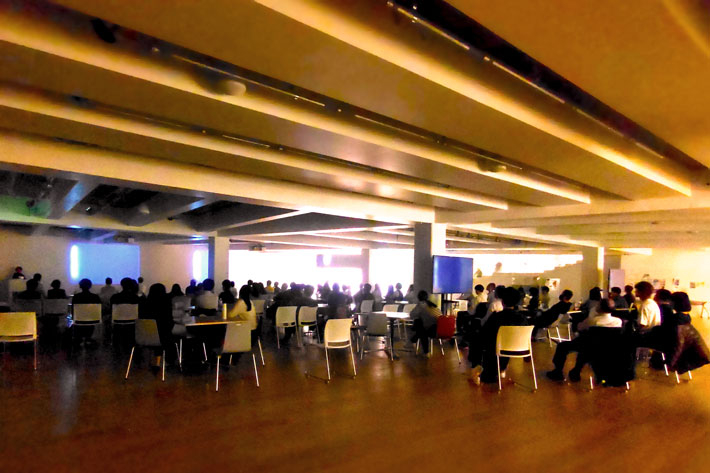
Screenings at central staircase area and event space in Taki Plaza
This event was organized and executed by the Tokyo Tech Volunteer Group (Tokyo Tech VG), an official student club involved in disaster reconstruction assistance and prevention activities, and was co-sponsored by the Institute for Liberal Arts. A total of 113 people, including 38 students and their family members, 28 faculty and staff members, and 47 members of the public attended the event to recall the Great East Japan Earthquake and reconsider approaches to disaster prevention.
Amid concerns that memories of the 2011 triple disaster were fading, Tokyo Tech VG planned this screening with the goal of creating a ripple effect that raises awareness on disaster prevention both within and outside the Institute. The event offered an opportunity for each participant to think about disaster prevention and mitigation while learning about the reality of the events that unfolded at Okawa Elementary School.
Before the screening, Tokyo Tech VG member and moderator Shota Matsuo gave a brief explanation of the purpose of the event and the activities of the volunteer student group. Attorney-at-law Masahiro Saito, who represented the plaintiffs’ families in the Okawa Elementary School tsunami victim lawsuit, then spoke about the families’ thoughts and feelings, the process of the trial, and the background and intention behind the production of the film. Saito personally requested to join the event after hearing about the planned documentary screening.
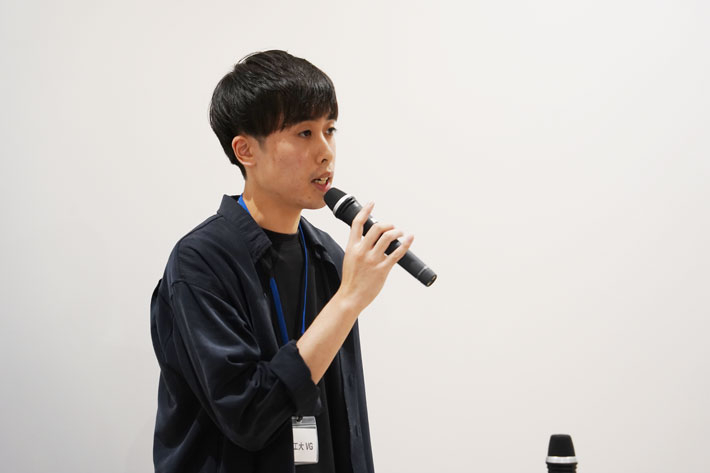
Moderator Matsuo
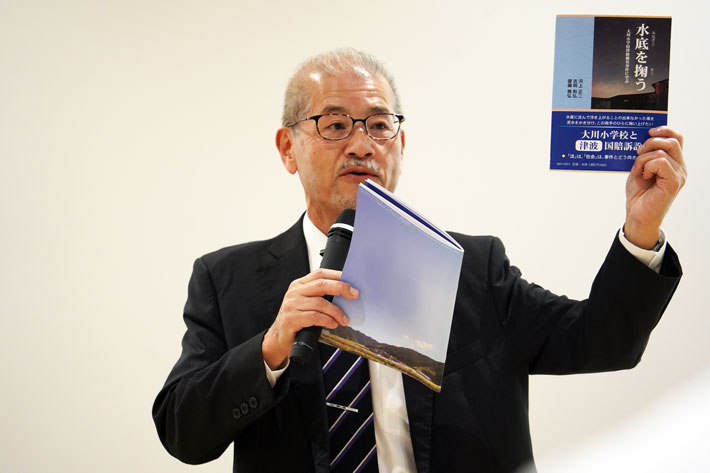
Attorney-at-law Saito speaking to participants
The 124-minute documentary included a number of sobering scenes, including parents searching for and finding their deceased children, and tenses confrontations between government officials and the bereaved families. Many audience members commented afterwards that hearing attorney-at-law Saito’s insights before the film was particularly helpful.
After the screening, Aoi Matsunaga, another Tokyo Tech VG member, expressed her impressions of the film, and introduced a study tour planned for next spring to visit the Miyagi 3.11 Tsunami Disaster Memorial Museum and other disaster sites in Miyagi Prefecture, including Okawa Elementary School.
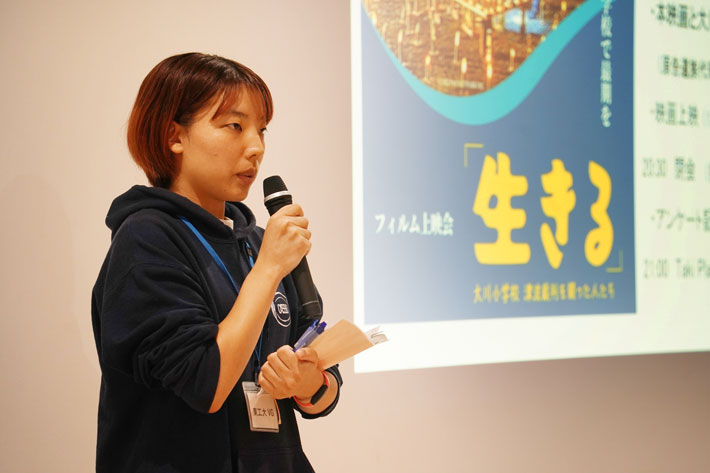
Matsunaga sharing her thoughts after screening
Some participants stayed behind after the event to fill out surveys and deepen discussions with attorney-at-law Saito. Overall, the film screening and talks provided a wonderful opportunity to think about not only disaster prevention, but also various aspects of society such as education, court cases, and the relationship between human beings and organizations.
Comments from event participants
It was painful to see the formation of wrongdoers when there should only have been victims.
The film made me think deeply about the feelings of both the parents and teachers.
This made me think about “responsibility,” an important component that must be considered amidst a tragedy like this.
I hope that people do not forget about fairness and are able to sincerely apologize for their own or their organization’s negligence.
The phrase “schools should not become the final resting place for children” left a strong impression on me.
It seems very tough to determine the “price of life” in the Japanese courts.
The plaintiffs’ relief after winning the case, and their feeling of “humanity” in the judge’s final words, left a strong impression on me.
I hope we can enjoy similar documentary screening events in the future.
Comments from Tokyo Tech Volunteer Group members
Shota Matsuo
4th year, Information and Communications Engineering
I had the pleasure of watching the film as a participant as well as serving as the moderator for this screening. To live not only documents the process leading up to the Okawa Elementary School tsunami trial, but also carefully depicts how the bereaved families have learned “to live” from immediately after the disaster to the present. I often wonder how I would think and act if I were in their position.
To protect your life and the lives of your loved ones from natural disasters that may occur at any time, it is important to prepare in advance for a variety of situations. Although many people understand this fact, few of us are able to actually take action. As a moderator, I felt the seriousness of the participants, and I believe that this screening gave each individual time to think about the difficulty of saving lives and what they can do to achieve that.
In addition to being a Tokyo Tech VG member, I am also a Tokyo Tech peer supporter. In terms of academics, I conduct mathematical research on signal processing and continuous optimization in the field of information and communication.
Aoi Matsunaga
2nd-year master’s student, Civil and Environmental Engineering
I decided to study civil engineering at Tokyo Tech after becoming interested in disaster management projects. Currently, I am conducting research on rivers, focusing on flood control.
I was in elementary school when the Great East Japan Earthquake occurred. Although I was far from the worst-hit areas, I remember very well how my teachers, parents, and myself acted on that day. Watching the film, I thought about what I would have done in that situation. The documentary also made me think about how it changed me, what I would and could do if I were in such a difficult position in the future.
Until now, I had thought about disaster preparedness and evacuation decisions, but I could not have even imagined the investigations that preceded and followed these big events, the thoughts of the bereaved families that led to the trials, and the human relationships and organizational structures behind them. I think we should be giving more consideration to what we can and should do in the future.
Tokyo Tech Volunteer Group
The Tokyo Tech Volunteer Group, an official Tokyo Tech student group supported by the Student Support Center’s Student Success Support Division, was formed after student volunteers visited affected areas soon after the Great East Japan Earthquake of March 11, 2011 to support the reconstruction process. Likeminded students soon joined the group, and in September of that year, momentum increased further with the Tokyo Tech Photo Rescue Project, an effort to clean water- and mold-damaged photos from the areas hit by the tsunami.
Today, the group plans and implements a variety of volunteer activities on and off campus, focusing on reconstruction support, disaster prevention, and regional cooperation. Specific activities include product exhibitions at the Tokyo Tech Festival and Homecoming Day to support reconstruction efforts in disaster-affected areas, assisting with on-campus disaster drills, implementing a Kids Cafeteria that offers nutritious food to both children and their parents, and mediating the donation and distribution of textbooks and other books through a used book fair.
Tokyo Tech VG holds lunch meetings once a week at Taki Plaza, and study tours to disaster-affected areas are currently being planned.








